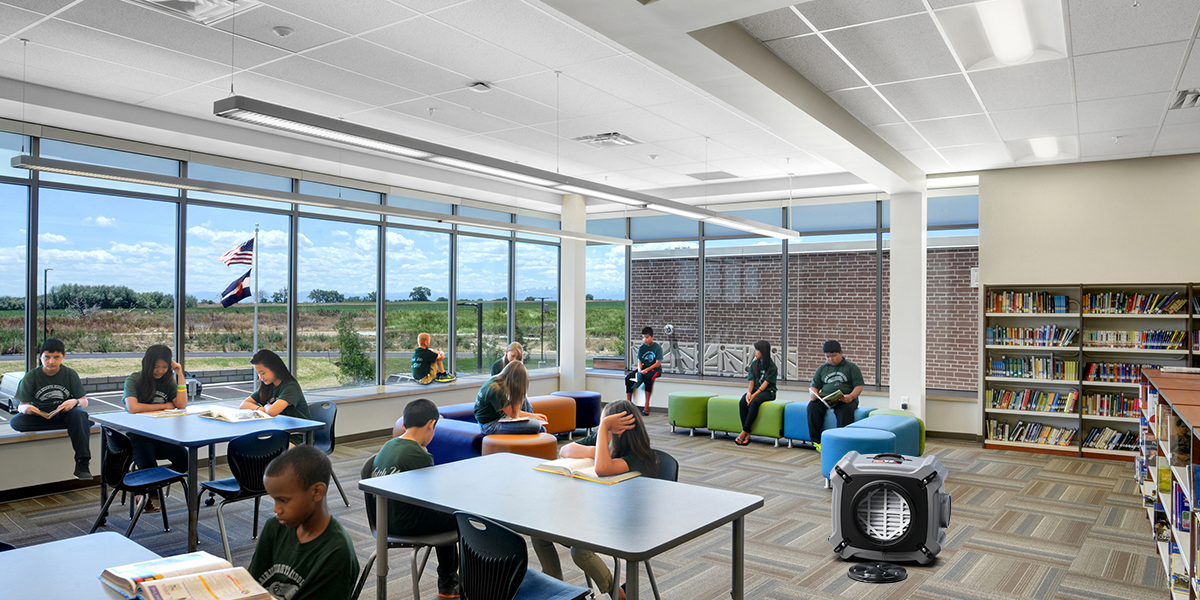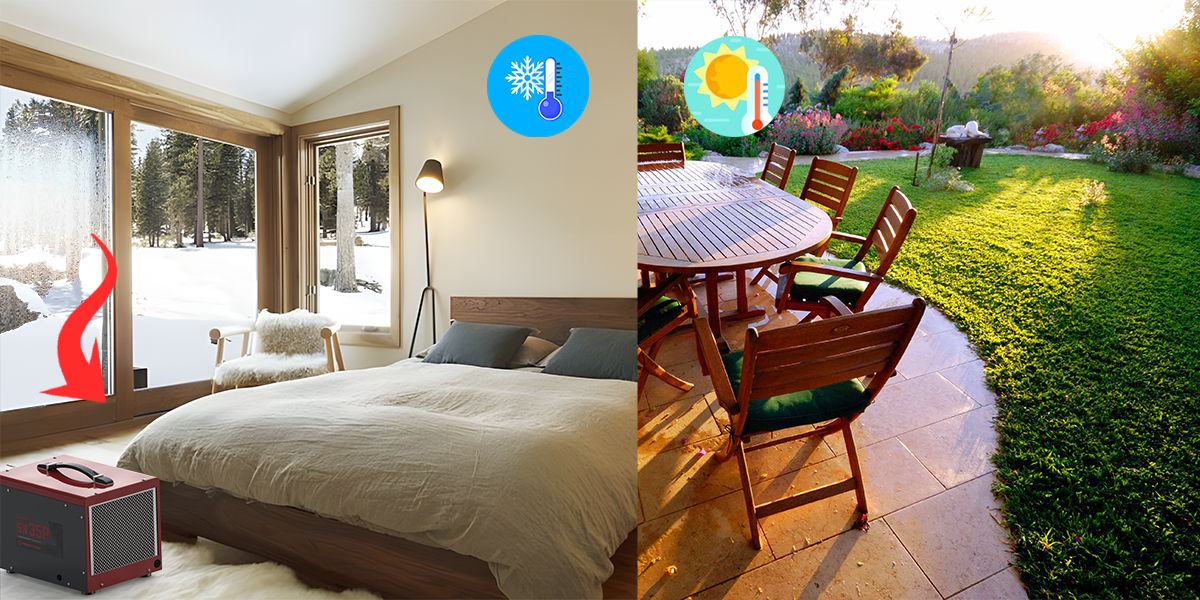In the dynamic world of retail, creating the perfect environment for both products and people is paramount. As seasons change, so too does the challenge of maintaining an ideal level of humidity within these spaces. Excessive moisture in the air can lead to a host of problems, from damaging delicate merchandise to diminishing the comfort and health of customers and employees alike. Conversely, air that's too dry isn't without its faults, potentially leading to static electricity issues and discomfort.
This is where commercial dehumidifiers step in as an essential tool for retail managers and store owners. By effectively managing indoor humidity levels, these devices ensure that products remain in pristine condition and that shopping environments stay comfortable year-round, regardless of the weather outside.
Understanding Humidity in Retail Spaces
Retail environments are particularly sensitive to the ebb and flow of seasonal humidity. In the summer, high humidity can make the air feel warmer than it is, leading to discomfort for both shoppers and staff. This moisture-laden air can also wreak havoc on certain products, causing clothing to feel damp, encouraging mold growth on organic materials, and even damaging electronic components through corrosion. Winter brings the opposite problem, with dry air that can lead to static electricity, which is not only a nuisance but can also harm sensitive electronic goods and create an uncomfortable shopping experience.
The Unique Challenges for Retail Environments
Each type of retail space faces its own set of challenges when it comes to managing humidity:
- Clothing Stores:High humidity can affect fabric integrity, and color, and lead to a musty smell, turning off potential buyers.
- Electronics Shops:Moisture is the enemy of electronic devices, leading to corrosion and malfunction, thereby increasing returns and reducing customer satisfaction.
- Grocery Stores: Fruits, vegetables, and other perishables can spoil more quickly in high-humidity environments, leading to waste and loss of revenue.
Properly managing indoor humidity is not just about maintaining the structural integrity of the space or the quality of the products; it's about creating a pleasant and inviting atmosphere where customers feel comfortable and staff can work at their best. This balance is crucial for ensuring the overall success and sustainability of retail operations. Commercial dehumidifiers offer a targeted solution to these challenges, enabling retailers to maintain optimal humidity levels throughout the year.
How Commercial Dehumidifiers Work
Commercial dehumidifiers are engineered to efficiently control the humidity levels in large spaces, such as retail environments. These devices operate by drawing in air from the surrounding environment, passing it over a refrigerated coil to condense out moisture, and then re-circulating the drier air back into the space.
The technology behind these systems is designed to be both effective and energy-efficient. Many modern commercial dehumidifiers come equipped with advanced features like automatic humidity control, which allows them to adjust their operation based on real-time conditions, ensuring that the indoor climate remains consistent without excessive energy use. Some units also offer additional functionalities, such as air filtration, further improving indoor air quality by removing dust, pollen, and other airborne contaminants.
By maintaining optimal humidity levels, commercial dehumidifiers help prevent the adverse effects of excessive moisture or dryness. This includes protecting against mold and mildew growth, preserving the integrity of products, and ensuring a comfortable shopping experience. For retail owners, this means fewer product losses, reduced maintenance issues, and a more inviting store atmosphere, all of which contribute to a better bottom line.
Benefits of Using Commercial Dehumidifiers in Retail Spaces
The deployment of commercial dehumidifiers within retail environments brings a multitude of advantages, the key among them being the safeguarding of merchandise, enhancing customer comfort, and preventing structural damage. Here's how these benefits break down:
Protection of Merchandise
Moisture can be detrimental to a wide range of products. For example, high humidity can cause clothing to become musty, electronics to corrode, and food products to spoil prematurely. By controlling indoor humidity levels, commercial dehumidifiers help ensure that merchandise remains in top condition, reducing waste and enhancing product appeal to customers.
Enhanced Customer Comfort
Shopping is not just a transaction; it's an experience. A store's environment plays a crucial role in shaping this experience. High humidity can make indoor environments feel warmer than they are, leading to discomfort and a potentially shortened shopping duration. On the other hand, too dry air can irritate the eyes, nose, and throat. By maintaining a balanced humidity level, commercial dehumidifiers contribute to a more pleasant shopping environment, encouraging customers to spend more time—and potentially more money—in the store.
Prevention of Structural Damages
Excess moisture in the air can lead to the deterioration of building materials and the growth of mold and mildew, posing health risks and potentially costly repairs. By keeping humidity levels in check, commercial dehumidifiers can help prevent these issues, preserving the integrity of the retail space and reducing maintenance costs over time.
Energy Efficiency and Cost-Effectiveness
Modern commercial dehumidifiers are designed with energy efficiency in mind, helping retailers manage humidity levels without incurring excessive energy costs. By optimizing the indoor climate, these devices can also reduce the load on heating, ventilation, and air conditioning (HVAC) systems, further lowering energy consumption and costs.
Implementing Dehumidification Solutions: A Step-by-Step Guide
Successfully integrating commercial dehumidifiers into a retail space's climate control strategy requires careful planning and execution. Here's a straightforward guide to ensure effective implementation:
Step 1: Conduct a Humidity Assessment
Begin with a thorough assessment of your retail space to understand the current humidity levels and identify the areas most affected by seasonal fluctuations. This step may involve using hygrometers to measure humidity or consulting with a professional for a detailed analysis.
Step 2: Determine Your Needs
Based on the assessment, define the specific humidity control needs of your retail space. Consider the size of the area, the types of products sold, and any particular challenges posed by the building's design or location.
Step 3: Select the Appropriate Dehumidifier
Using the insights from your needs assessment, choose a commercial dehumidifier (or multiple units) that best suits your space. Pay attention to capacity, energy efficiency, and features that match your requirements.
Step 4: Plan for Strategic Placement
For maximum effectiveness, carefully plan where to place the dehumidifiers within your retail space. Locations near sources of moisture or areas where customers and staff spend most of their time are usually ideal. Ensure that the units do not obstruct traffic flow or negatively impact the aesthetics of the store.
Step 5: Installation
Install the dehumidifiers according to the manufacturer's instructions. Consider hiring professionals if the installation process is complex or if it needs to be integrated with existing HVAC systems.
Step 6: Monitor and Adjust
After installation, closely monitor the dehumidifiers' performance and the overall humidity levels in your space. Be prepared to adjust settings and placement as needed to achieve optimal results.
Step 7: Maintain Your Dehumidifiers
Regular maintenance is crucial to keep your dehumidifiers running efficiently. Follow the manufacturer's guidelines for cleaning and servicing the units to ensure they continue to effectively manage humidity levels over time.
Conclusion: Ensuring Retail Success Through Optimal Humidity Control
In conclusion, the strategic implementation of commercial dehumidifiers in retail settings is an investment in the store’s future. Not only does it directly contribute to a more positive shopping experience, but it also indirectly supports business growth by protecting inventory and ensuring a healthy indoor environment.
For retailers looking to enhance their climate control strategies, Abestorm's range of advanced dehumidification solutions offers the perfect blend of performance, energy efficiency, and reliability. With products designed to meet the diverse needs of the retail industry, Abestorm is committed to helping businesses thrive by providing the tools needed to maintain optimal indoor conditions effortlessly.
Take the Next Step Toward a Better Shopping Experience
Don't let seasonal humidity fluctuations dictate the comfort of your retail space and the well-being of your merchandise. Explore the benefits of commercial dehumidifiers and take control of your indoor environment.









Shop For Dehumidifier